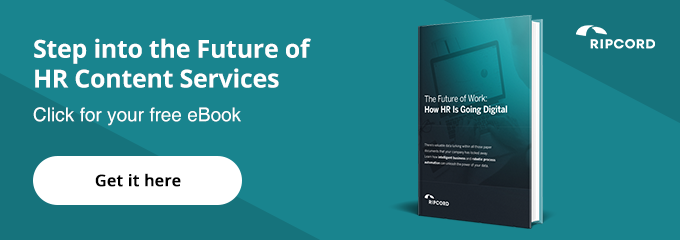
Is a Paperless HR Department Really Possible?
Human resources is and has long been a document-heavy line of work. Forms relating to employee hiring, benefits, compensation, complaints, and termination, for example, all require significant amounts of paperwork to be filled out, signed, and stored.
Today, with so much of the world's knowledge workforce still performing jobs from home, those document requirements haven't gone anywhere. They've simply become that much harder for HR personnel to track, update, and manage.
So, what's an HR department to do?
A modern HR department has choices that were not available a few short years ago. Today, it's possible for HR to go completely paperless and still remain efficient, effective, and compliant in all respects. Below we explore some of the top benefits of digitized documentation for human resources departments everywhere.
Digitization Meets the Needs of a Distributed Workforce
While many states have eased COVID-19-related restrictions, nationwide upticks in new cases, combined with the arrival of cooler weather, will very likely mean that far more widespread remote work is here to stay. This means that keeping track of the paper documentation that goes hand-in-hand with the business of HR is no longer a matter of going to a dedicated file room in an office building or heading down the hall to retrieve a form from a new hire who owes the HR department an important signature. The same holds true if the company rents or owns offsite storage space to house its paper files.
In the COVID-19 era, the movement of tangible items (like documents) across states and even countries is not only a logistical and financial headache, but it poses potential health risks, too.
Digitizing HR documentation with solutions like Ripcord's Canopy, however, eliminates the need to search for, ship, and await needed documentation. With Canopy, mountains of data are available to a client in its own, cloud-based, highly secure instance, complete with sub-second search. Canopy enables the instantaneous indexing, classification, and retrieval of both structured and unstructured data ported over to the client's instance. So Canopy clients can kiss all that HR paperwork goodbye and say hello to digitized documents that are easily searchable and available from any device at any time to those with access to the system.
Digitization Meets Compliance Requirements
Few departments in an organization are as regulation-burdened as human resources. Federal, state, and local laws all require compliance by businesses, and that compliance takes the form of large quantities of paperwork to be read through, filled out, signed, and returned to HR, where, by law, each document must be stored for a specific number of years.
Companies across industries may have more remote employees these days, but that doesn't mean they have fewer employees overall or that they're not adding new ones all the time. HR personnel is still expected to obtain the necessary paperwork from new hires (as well as those who may be leaving the company), despite no longer being able to simply ask the individuals for it in person. With HR digitization, that's no longer a problem. Digitized documents can be easily added to the cloud and accessed at any time they are needed, providing a clear audit trail that meets all regulatory requirements.
HR Digitization Can Drive Organization-Wide Digital Transformation
Going paperless (and doing it right) is not an overnight process. It can take time to digitize the voluminous amounts of paperwork belonging to an organization, especially if said paperwork dates back many years or even decades. It takes time and resources to train employees on the use of a top content management system. However, for many organizations, the HR department is a logical place to start digitization initiatives. Once HR staff becomes adept at using a content management system and locating needed documentation, the organization as a whole can begin to see how such a system can pay off in the long run.
As is often the case, HR can be the vanguard of change and growth in the area of digitization for a company, leading the way to true digital transformation that drives business growth. If document-heavy HR — with all its legal and personnel-related requirements — can go paperless and save time and money, then it's only a matter of time before the rest of the company does it, too.
Learn more about how you can step into the future of HR content services.
/Ripcord%20Logo%20-%20Color%2011.png?width=2000&height=620&name=Ripcord%20Logo%20-%20Color%2011.png)


%20What%20It%20Is%20and%20Why%20It%20Matters%20-%20Ripcord.jpg?quality=high&width=596&name=Unlocking%20the%20Power%20of%20Robotic%20Process%20Automation%20(RPA)%20What%20It%20Is%20and%20Why%20It%20Matters%20-%20Ripcord.jpg)
.jpg?quality=high&width=596&name=Revolutionizing%20P%26C%20Insurance%20The%20Power%20of%20Intelligent%20Document%20Processing%20and%20AI%20-%20Ripcord%20(1).jpg)
.png?quality=high&width=596&name=Five%20Best%20Practices%20for%20RPA%20Implementation%20-%20Ripcord%20(1).png)